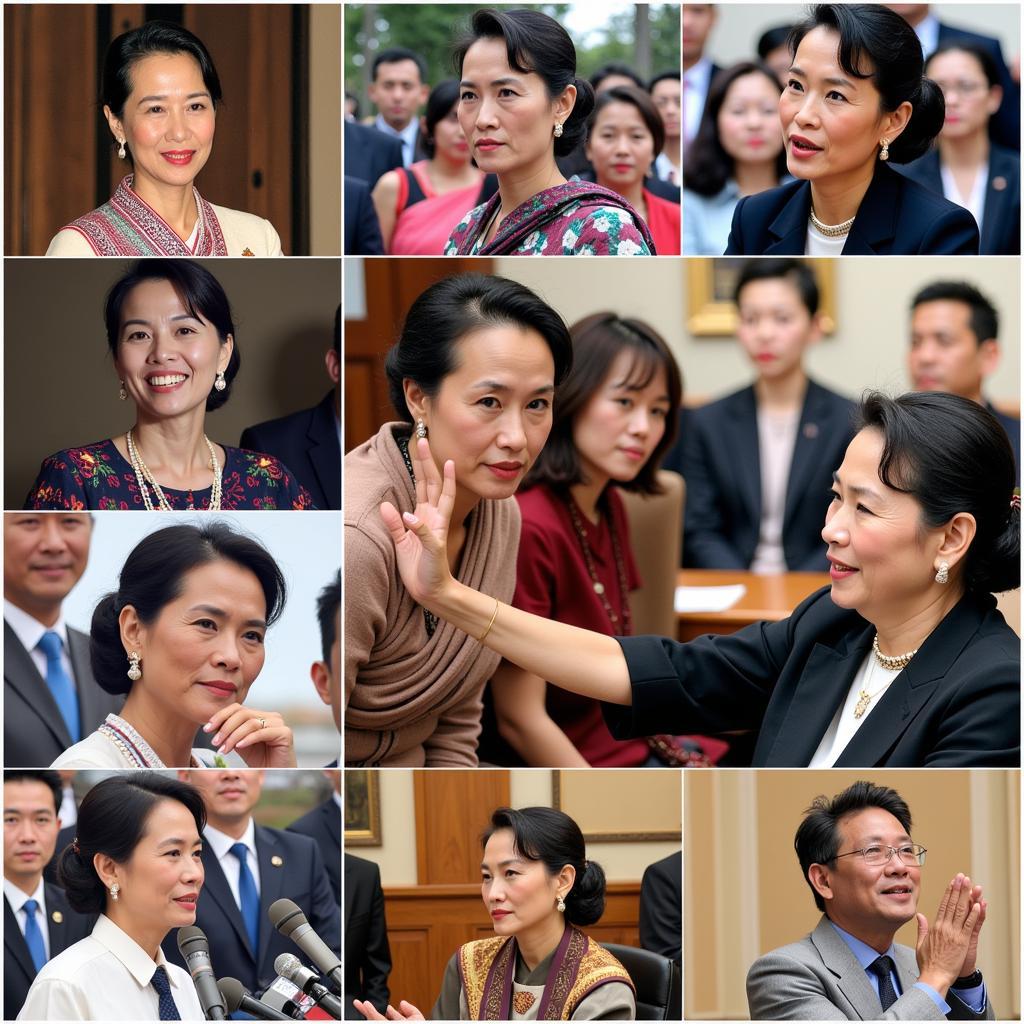Aung San Suu Kyi and ASEAN’s relationship has been a complex and often fraught one. From Nobel Peace Prize laureate to a figure embroiled in controversy, Suu Kyi’s journey has been closely intertwined with the political landscape of Southeast Asia. This article delves into the multifaceted relationship between Aung San Suu Kyi and ASEAN, examining her rise to prominence, her fall from grace, and the implications for the region.
 Aung San Suu Kyi's political career in pictures
Aung San Suu Kyi's political career in pictures
The Rise of an Icon
Aung San Suu Kyi emerged as a symbol of democracy in Myanmar during the late 1980s, leading the National League for Democracy (NLD) in its struggle against the military junta. Her unwavering commitment to nonviolent resistance and human rights earned her international acclaim, culminating in the Nobel Peace Prize in 1991. ASEAN, during this period, grappled with how to engage with the Myanmar regime while supporting Suu Kyi’s calls for democratic reforms. asean aung san suu kyi
ASEAN’s Balancing Act: Engagement and Pressure
ASEAN member states adopted a policy of constructive engagement with Myanmar, hoping to encourage political change through dialogue and cooperation. However, this approach was often criticized for its perceived leniency towards the military junta. The organization faced the difficult task of balancing its principle of non-interference in the internal affairs of member states with its commitment to promoting democracy and human rights.
From Icon to Pariah: The Rohingya Crisis
Suu Kyi’s release from house arrest in 2010 and the NLD’s subsequent electoral victories in 2015 and 2020 were seen as triumphs for democracy. However, the Rohingya crisis in 2017 drastically altered her international image. Suu Kyi’s defense of the military’s actions against the Rohingya, which have been widely condemned as ethnic cleansing, led to widespread condemnation and the revocation of numerous international awards. asean and aung san suu kyi
ASEAN’s Response: A Test of Unity
The Rohingya crisis presented a significant challenge for ASEAN. The influx of refugees into neighboring countries strained resources and raised tensions. While some member states expressed strong criticism of Myanmar’s actions, others adhered to the principle of non-interference, creating divisions within the organization. The issue tested ASEAN’s unity and its ability to effectively address human rights violations within its own ranks.
“The Rohingya crisis was a turning point for ASEAN,” states Dr. Anya Sharma, a Southeast Asia expert at the Institute for Regional Studies. “It exposed the limitations of the organization’s non-interference principle and forced it to confront the difficult balance between sovereignty and responsibility.”
A Uncertain Future: ASEAN and Myanmar
The 2021 military coup in Myanmar, which ousted Suu Kyi’s elected government, further complicated the situation. ASEAN has once again been called upon to play a mediating role in the ongoing crisis. The organization’s Five-Point Consensus, calling for an end to violence and a dialogue between all parties, represents a significant effort to address the crisis, but its implementation remains challenging. asean aung san suu kyi maharthiya
What role can ASEAN play?
ASEAN’s role in resolving the Myanmar crisis is crucial. The organization’s credibility and its ability to effectively promote regional stability are at stake. Finding a sustainable solution that respects the will of the Myanmar people while upholding democratic principles remains a daunting challenge.
“ASEAN must go beyond rhetoric and take concrete actions to address the root causes of the crisis,” says Dr. Michael Tan, a political analyst at the ASEAN Studies Center. “This includes engaging all stakeholders, including ethnic minority groups and civil society organizations, in a meaningful dialogue.” asean ambassador aung san suu kyi
Conclusion: The ASEAN Aung San Suu Kyi story continues to be a complex and evolving narrative. Her legacy, once celebrated, is now deeply contested. ASEAN’s response to the unfolding events in Myanmar will have significant implications for the region’s future. asean aung san suu kyi malaysia prime minister discussion The relationship between Aung San Suu Kyi and ASEAN underscores the challenges faced by the organization in navigating the complex political landscape of Southeast Asia and its ongoing struggle to balance its commitment to non-interference with its aspirations for a democratic and peaceful region.
When needing support, please contact us via Phone: 0369020373, Email: aseanmediadirectory@gmail.com or visit us at: Ngoc Lien Village, Hiep Hoa, Bac Giang, Vietnam. Our customer service team is available 24/7.